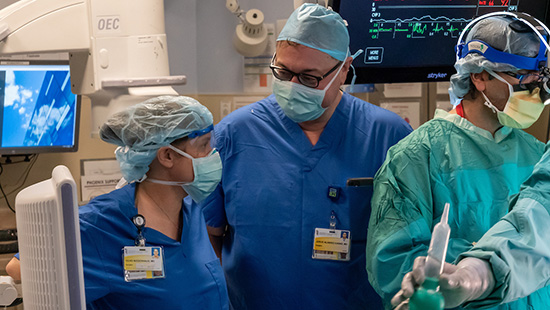Kidney Transplant

Kidney transplant surgery can be a life-changing option superior to dialysis for people with kidney failure resulting from conditions like diabetes, uncontrolled high blood pressure or different types of kidney disease.
As the state's largest kidney transplant program, the University of Maryland Medical Center transplant team has performed more than 6,000 kidney transplants since 1988.
Living Donor Kidney Transplant
A living donor kidney transplant has many advantages over a deceased donor kidney transplant. Patients often experience better outcomes and significantly shorter wait times to receive a kidney. A living donor transplant can be scheduled, allowing the donor and the recipient to pick a time that works best for them.
Find out if you're eligible to donate.
How You Can Help: Recipients with living donors get transplants faster and have better outcomes. Even if you cannot be the donor, you can play a valuable role by becoming a living donor transplant champion. Learn more about living donor champions.
Keeping You Safe During COVID-19
Our team takes every precaution to keep you and your loved ones safe during your transplant process. Some steps we're taking include:
- Scheduling telemedicine appointments instead of in-person whenever possible
- Maintaining a COVID-free floor for our transplant patients
- Testing all donors and recipients 48-72 hours prior to surgery, then quarantining until surgery
If you have any questions about our COVID-19 protocols, we encourage you to ask. You may also learn more about our approach to COVID-19 in this video.
Our Experts
You'll receive care from an experienced multidisciplinary team that includes:
- Nephrologists (kidney specialists) who will manage your kidney care after transplant
- Surgeons specializing in kidney transplant
- Nurse coordinators specially trained in transplant care who are your contact throughout your entire transplant process
- Transplant immunologists and researchers, who are nationally recognized physicians and researchers specializing in the immune system, working on new ways to reduce the risk of organ rejection
- Social workers, pharmacists and nutritionists who help you and your family understand the care you need before and after transplant
Who is a Candidate
You may be a candidate for kidney transplant if you have:
- End-stage renal disease (ESRD) – Kidney transplantation is a life-enhancing option superior to dialysis for people with loss of kidney function or ESRD. If you are HIV-positive or hepatitis C-positive, you may still be eligible for transplant.
- Insulin-dependent diabetes with dialysis – Transplant restores kidney function but does not cure diabetes. You may have simultaneous kidney-pancreas transplant to eliminate kidney failure and diabetes.
Referrals
Physicians and health professionals may refer patients for kidney transplant evaluation by calling 410-328-5408.
Kidney Transplant Evaluation
During COVID-19, we are doing complete evaluations online, creating the smoothest and safest experience possible for you. Your kidney transplant nurse coordinator will help you schedule all the necessary appointments.
During a 4-hour telemedicine appointment, you'll meet with our experts, including a nephrologist, transplant surgeon and cardiologist, who will evaluate you for the procedure. Our team will also:
- Describe the transplant process
- Explain what happens after transplant, including the medications you will need to take, and explain the benefits and the potential side effects of transplant
- Ask about your insurance, finances and who will help care for you after surgery
- Determine if you are strong enough for the surgery
You may include someone, such as a family member or friend, who can help you take notes and ask questions.
Waiting for a Transplant
After completion of your evaluation, we will put you on the kidney transplant waiting list, maintained by United Network for Organ Sharing (UNOS). Your wait time depends on factors such as the duration of advanced kidney failure, availability of matched donors, and the number of donors in your area compared to the number of people needing a transplant.
Recovery
After your transplant, your nurse navigator and other members of your care team will help you and your caregivers learn how to protect your new kidney, recognize signs of rejection and live a healthy lifestyle to support your new kidney. You will:
- Go home a few days after surgery.
- Visit your care team weekly or biweekly for the first few weeks after surgery. You'll have outpatient testing, including blood work, to check for possible infection, or organ rejection.
- When your condition is stable, we will refer you back to your primary care physician for routine healthcare and will coordinate with your physician as needed.
- Your post-transplant nurse coordinator is always available to answer your transplant-related questions.
You will have fewer appointments as you transition from someone with end-stage renal disease to someone with a functioning kidney. Learn what to expect during and after kidney transplant.
Why Choose UMMC
The benefits of kidney transplant at University of Maryland Medical Center include:
- Expert multidisciplinary team provides care for your kidney to maximize the longevity of the kidney and minimize the risk of infections and side effects .
- Advanced procedures – The latest surgical techniques and technologies, including laparoscopy and robotic surgery, reduce pain and minimize recovery time.
- National Kidney Registry – We have greater flexibility in finding suitable donor-recipient pairs for kidney transplant as a participant in the National Kidney Registry through paired kidney exchanges (PKE).
- Access to latest treatments – As an academic medical center, patients can participate in clinical trials offering access to the most advanced treatments, such as immunotherapies, before they are available elsewhere.
- Polycystic kidney disease (PKD) treatment – We can remove both kidneys in one surgical procedure for patients with polycystic kidney disease.
- The UMMC Transplant Center is proud to be part of the APOL1 Long-term Kidney Transplantation Outcomes (APOLLO) Network, a national study supported by the National Institutes of Health (NIH) that works to address racial disparities in kidney transplant outcomes.
Schedule a Kidney Transplant Evaluation
To request a kidney transplant evaluation, please call 410-328-5408.

